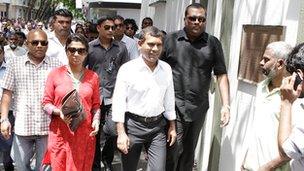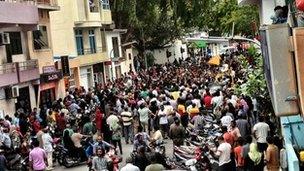Ex-Maldives president takes refuge at India embassy
- Published

Mr Nasheed won the country's first democratic elections in 2008
Former Maldives President Mohamed Nasheed has taken refuge at the Indian High Commission in the capital, Male, after a court ordered his arrest.
Police have been deployed near the building, as dozens of supporters protested against the charges.
An aide said Mr Nasheed would remain at the embassy until an agreement was reached with the government.
The Maldives was thrown into turmoil in February 2012 when Mr Nasheed was ousted in what he says was a coup.
A magistrate ordered his arrest on Wednesday, saying Mr Nasheed failed to attend a court hearing on charges of illegally detaining a judge during his time in office.
Mr Nasheed had accused the judge of deliberately obstructing investigations of political figures linked to a previous government.
Arrest order
Eva Abdulla, an MP and relative of Mr Nasheed, said the trial against him was politically motivated and designed to prevent him from running in elections later this year.
"They will go to any lengths to eliminate him from the ballot," she said, speaking from the embassy.

Mr Nasheed's Maldivian Democratic Party has called for demonstrations
She told the BBC the former leader was in talks with the Indian High Commissioner. She said could not say how long he would stay there, but that it would at least be overnight.
Police say they are on orders to arrest Mr Nasheed but will not enter the building.
"We have received the [arrest] order and we will be trying to carry it out in accordance with the Maldivian constitution and the order itself," spokesman Hassan Haneef said.
Mr Nasheed swept to power in 2008 after winning against President Maumoon Abdul Gayoom, who ran the archipelago autocratically for 30 years.
He claims he was forced to quit under duress after soldiers and police mutinied and overran the party's headquarters in Male.
But his successor, Mohamed Waheed Hassan Manik, who had been serving as his vice-president, insists that Mr Nasheed left of his own accord after opposition-led protests.
- Published1 October 2012
- Published2 October 2012
- Published26 September 2012
- Published18 April 2012